Religion as a weapon of union and coexistence between cultures

The Embassy of the United Arab Emirates in Madrid, in collaboration with Casa Árabe, hosted a meeting in which religion and culture were the protagonists in which tribute was paid to the concept of 'inter-religious dialogue' as a tool for promoting peace.
In an increasingly polarised context, in which religions have shaped the course of various historical events, extremism and radicalisation have affected the cultural and political development of different states. Using people's faith, extremist groups and hate speeches have sown disorder in different societies in which separation has prevailed over social union. In this sense, the event aims to build bridges between different religions in order to make the world a better place, where interculturality and coexistence reign.
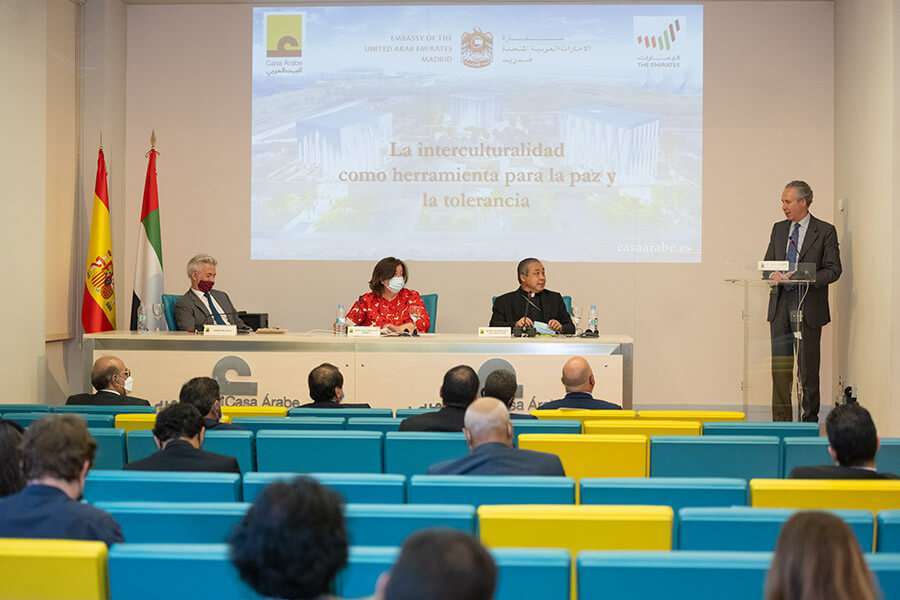
Pedro Martínez-Avial, Casa Árabe's Director General, welcomed the participants, stressing the need to hold events of this kind, since "this event promotes interculturalism and coexistence" in an environment in which we must try to promote "respect and tolerance" in order to "encourage religious dialogue".
After the reception, UAE Ambassador Majid al-Suwaidi was introduced, who emphasised that "coexistence makes us better people". In this sense, the ambassador stated that he hopes to be able to continue "walking hand in hand with our allies and friends" and to promote "dialogue".
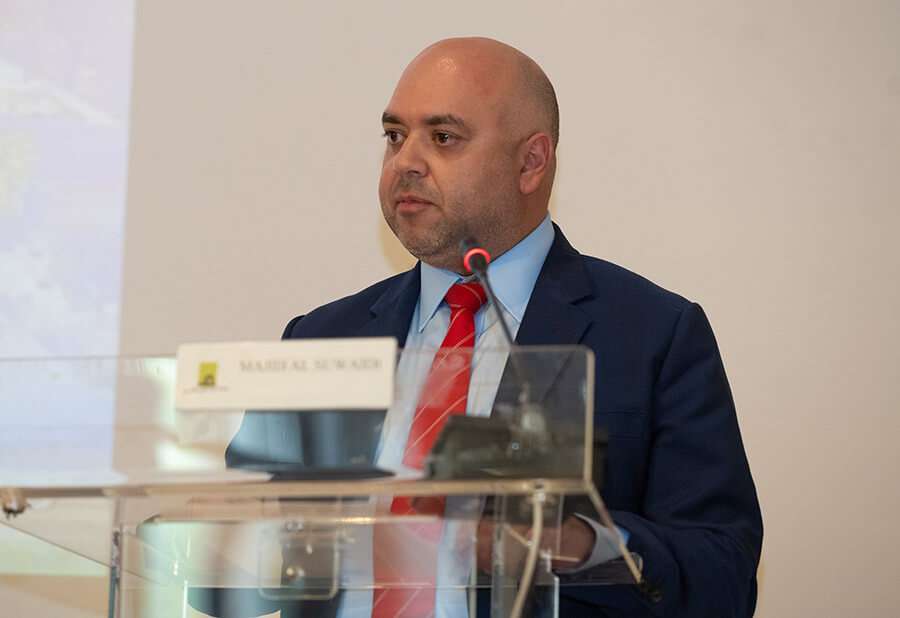
In addition, the diplomat stressed that "tolerance will always be a fundamental component in the identity of the United Arab Emirates, whose structure is based on the mutual promotion of cultural understanding". Majid al-Suwaidi highlighted the implementation of the project 'The Abrahamic Family House' in Abu Dhabi, a construction that houses the three temples of the three monotheistic religions on the same esplanade.
After this intervention, Federico Mayor Zaragoza, president of the Foundation for a Culture of Peace, made an online statement and added that "it is possible to resolve conflicts through diplomacy" whilst criticising the culture of war, arguing that "it is unacceptable that millions of dollars are invested in weapons when millions of people cannot eat". "All human beings are equal, we are not going to resolve conflicts with weapons but with words, with dialogue", he stressed.
Federico Mayor Zaragoza stated that "in order to promote a culture of peace, we have to look at others and understand them, as they may be right, despite our differences (...) we can all share and live together" in a society in which "all human beings are equal in dignity".
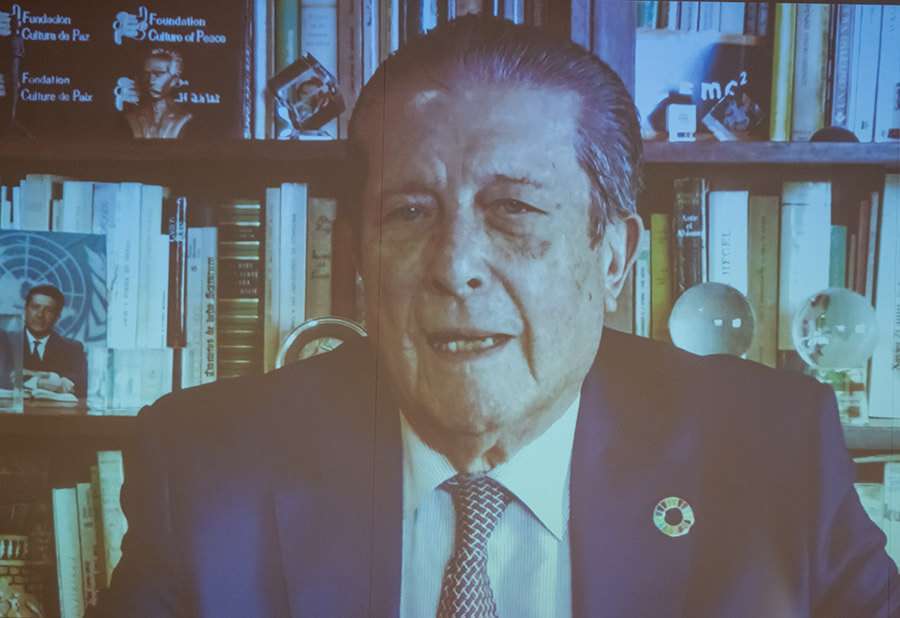
Federico Mayor Zaragoza also spoke about the 2030 Agenda, in which he proposed the need to change the ways in which the world is structured. In this regard, he stated that "it cannot be possible for the richest countries to be the ones giving instructions" and urged for the establishment of a "new policy" in which the weighted vote is supported and the veto is rejected, while he has opted for the power of words "to build solutions". To conclude, Mayor Zaragoza stressed that "there is a duty to speak out in the present in which many things have to be changed".
Subsequently, the Ambassador-at-Large for Mediation and Intercultural Dialogue, Ramón Blecua, stated that "the definition of cultural narratives is transcendental for the future (...) there is no possibility for hatred or racism to take root in a cosmopolitan society".
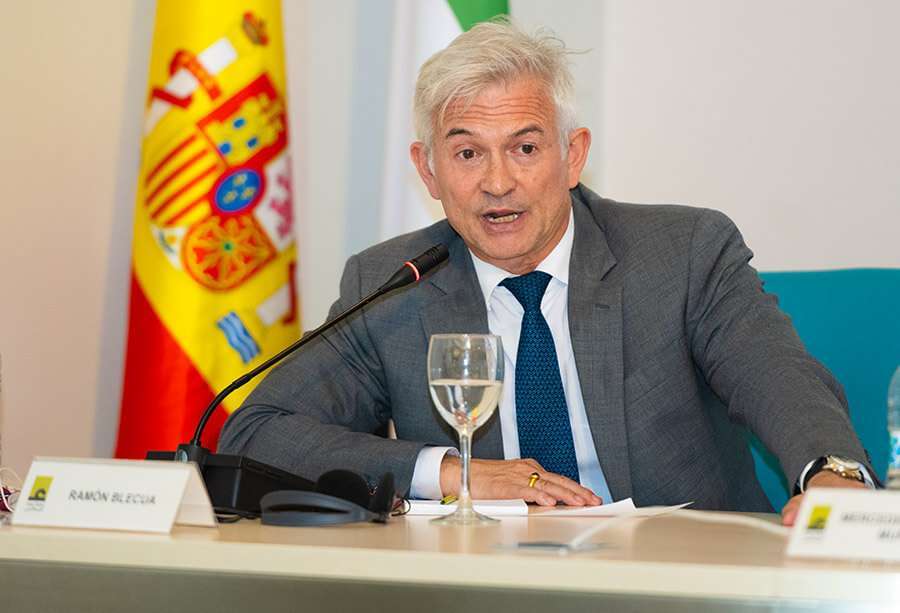
In this sense, he has brought together the spirit of Mosul, an enclave in which, before the jihadist offensives, multi-cultural histories existed in which the coexistence of cultures and religions in the Middle East could develop. Similarly, the ambassador used Spain as an example to illustrate how the country played, and continues to play, an "important role in a culture of multiplicity in which an enormous cultural fertilisation of the times led to an important symbolic resonance".
On the other hand, the Deputy Director General for Religious Freedom of the Ministry of the Presidency, Mercedes Murillo, said that "the challenge is to find ways in which we can live together in difference" and to make "an exercise of equality in freedom of conscience" in which "differences are not seen as a threat", since there is "social resilience in the face of hatred".
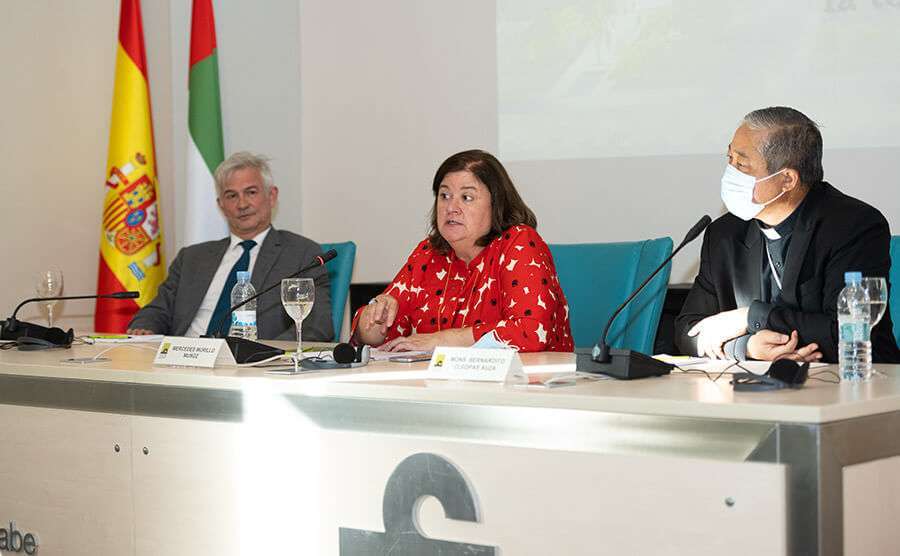
Finally, the Apostolic Nuncio of the Holy See to Spain, Bernardito Cleopas Auza, affirmed that tolerance "is fundamental for peace and coexistence" and that this is promoted through "greater dialogue with all religions and cultures, in which there is no ambiguity". The Nuncio mentioned Pope Francis as a reference figure who has tried to build bridges in order to maintain peace, despite differences. Along these lines, he named the three elements which, according to the Pope, are necessary in the construction of peace and coexistence. In this sense, "one must respect oneself and others", as well as having "sufficient courage to accept differences" and "follow a path of righteousness".

Furthermore, the diplomatic representative stressed that "the good of each resides in the good of all", which is why it is necessary for us to "enter together as a family in an ark", thus making a comparison with the biblical passage of Noah's Ark.
Thus, religion seeks to reinvest itself towards a new concept that embraces society equally in an exercise in which spirituality and faith are the protagonists that lead the way towards equality and understanding between cultures in order to build a better and more loving world.









